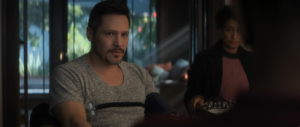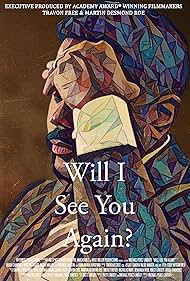If you have ever had a falling out with someone, you remain guarded. It doesn’t matter if that friend or loved one is separated by distance or time, their presence still lingers like the warmth of a handprint on a cold window. What happens, though, when you are confronted with that person once again? Would you keep your wall up and just try to escape the interaction, or would that hidden desire to reconcile propel you to let everything go? In Michel Perez-Lindsey’s reflective, one-of-a-kind short, Will I See You Again?, two queer men look back in order to step forward.
Will I See You Again? centers on the fractured relationship between Hosea Chanchez’s Max and Nick Wechsler’s Paul, former friends with a deeper past. When their mutual friend, Jim, passes away, they must confront each other for the first time in years to settle their differences. This is not simply about receiving an endowment but the beginning steps of redemption. This pair of men must honestly ask and answer a series of questions to one another, while hooked to a polygraph machine, in order for this process to work. The script, written by Perez-Lindsey’s husband Rhett Lindsey, is a potent exploration of self-reflection. You can sense the personal touches in the words spoken to each other by these men.
“Sometimes when I am about to run errands, I will find out that my avid writer husband is going to do some writing,” Perez-Lindsey says. “On one particular day, I come back and he’s written this incredible story, and it’s pulled all these things from his life, his friends that he’s known, and his entire collective experience. It was a story of self-acceptance and addressing the truth, and this polygraph was the conduit that brings two characters with unresolved business together. I told him that he needed to put it in a script format, because I was so blown away by it. We sat together and fine tuned it until we got into a space where we really believed in what we invested our time, energy and resources into. He really blew it out of the water.

He grew up in Georgia and went to a Christian conservative church, so there’s a lot of elements of his experience that he crafted into this story. When we worked together, I went in and helped by adding a couple pieces of my own experience into the characters. They are fictional characters, but they are a collection of different experiences that I’ve had and my husband has had. The whole notion was finding a way of telling a story that anyone can resonate with.”
A man of God, Max is understandably nervous before he understands what is going on, but Anna Maria Hosford’s Barbara comforts him by saying, ‘I see you just as you are.’ Horsford looks Chanchez right in the eye when she says it, and we realize that Max may have never been given such space before.
“I think she one hundred percent gives him permission to be himself,” Chanchez admits. “With a lot of moments in the film, I grew up in the South like Rhett did, and I also grew up in the church. My family was very religious and my existence in the south, in Alabama, was very much segregated and a religious experience. I know firsthand what it’s like to live your life with other people’s ideals over you. I consider myself more spiritual than I am religious at this stage of my life, but I think we all can identify with what it means to have not lived an authentic life. To not be who we feel you are one hundred percent. Anyone can feel like that–it doesn’t matter what your sexuality is, so to have someone tell you that you are okay in this lifetime and to just be as you are, is an enormous permission that every human desired. It doesn’t matter who you are. It really gave me the courage and the freedom to dive in deeper.”
There is an undercurrent of amusement in certain moments, because we are seeing reluctant men laying their emotions bare while being monitored by Barbara and two polygraph operators. It relaxes tense moments, but we never lose sight of the emotional stakes throughout the entire film. Every time I see the film, I wonder if people would be able to handle such an assignment.
“Our actors are so seasoned and played off each other’s energy,” Perez-Lindsey says. “The vibe on set was so respectful, and it was a very controlled environment where we lived in this space. With the polygraph section, Whitney Morgan Cox and Rosanny Zayas, as the polygraph operators, are the proxies and carry this empathetic nature. We wanted to keep this notion that all the women in the film are supportive of these two men having this vulnerable, transparent experience.”
 “For me, through the character and in my life, I had a heavy influence of women who raised me,” Chanchez says. “My father wasn’t in my life growing up, and there is something about having women in a room who understand a man that allows a man to live in this truth. I think a lot of us men feel more comfortable to be honest and open with women. I’ve always felt more judged by men, so I tried to give that a little bit more in those moments.”
“For me, through the character and in my life, I had a heavy influence of women who raised me,” Chanchez says. “My father wasn’t in my life growing up, and there is something about having women in a room who understand a man that allows a man to live in this truth. I think a lot of us men feel more comfortable to be honest and open with women. I’ve always felt more judged by men, so I tried to give that a little bit more in those moments.”
Will I examines a much debated intersection between faith and sexuality. Paul views organized religion a hypocritical, and he cannot reconcile Max’s faith with being an out and proud gay man. Do we need to accept that paths run parallel and we aren’t on the exact same ones as our peers and loved ones?
“Paul’s experience is so much different than Max’s,” Perez-Lindsey says. “Max is still in this stage of figuring out who he is, but, from Paul’s perspective, he doesn’t understand how Max cannot see the problem. Max thinks they are different paths. Paul, at first, doesn’t understand that because Max wears the cloth as a Black man that there is this added pressure that comes from his experience.”
“It’s a feeling that Black men that I know and people of color in general have always felt and thought there’s an air in our society,” Chanchez says. “Our walks are different. I do believe our cultures and our acceptances are different. It was honestly the most forefront thing in the script for me, and Mike address it early on. It was black-and-white for me that I could play versus the nuances of it just because of humanity and where we come from. Also, just the large part that society plays in masculinity as it pertains to Black men, our culture and the nuances that exist. Hyper masculinity exists in the culture and this allowed me to think about that. When it came to how we’re able to live our lives in the box that we’re put in a Black men, that was the one thing that I knew for myself. I could understand that feeling more than anything.”
Perez-Lindsey’s film recognizes the difficulity of these conversations, and he reveals that there is more to come.
“My husband is very thorough,” Perez-Lindsey says. “He wrote foundational backgrounds for all the characters since the film alludes to a past. We actually have a complete pilot for this which dives much deeper into the history of these two characters. We have an eight-hour limited series put together to bring this story to broader audiences and explore what happens.”









